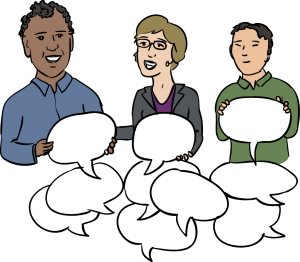Do you facilitate conversations? And, do you work virtually, or want to, yet need some convincing as to why virtual facilitation skills matter? Here is my logic case for why and how you should invest some personal learning equity in social technologies.
Communication is about sending and receiving messages.
Living beings communicate their message through verbal (e.g., oral, written) and non-verbal (e.g., body language) means.
In Real Life, non-verbal has more weight than verbal communications.
In virtual contexts, verbal, oral and written, communications have more power, as we don’t have access to many/most non-verbal cues (even when videoconferencing).
The world of communications and conversations is increasingly virtual.
Conversation facilitators understand that change happens through conversations.
When those conversations are virtual, there is a lot of noise (i.e., technology)… the medium can overwhelm the message.
The facilitator’s challenge is to mitigate noise, and have messages effect, as intended.
How do conversation facilitators get better at virtual clarity?
One way is to design virtual spaces that facilitate interaction and authentic conversations.
Another way is to get comfortable at mitigating noise, i.e., get comfortable with the tools, the technology.
Today, more than ever the medium is the message.
Is there a better reason why conversation facilitators need to learn the social technologies of today?
[Facilitating virtual conversations will form part of an e-learning course I’m currently developing around virtual collaboration and communications. Subscribe to my blog, and you’ll get notified when its’ available.]
[The image is by Tanya Gadsby. Watch for our upcoming e-book collaboration, just in time for X-mas!]


Speak Your Mind